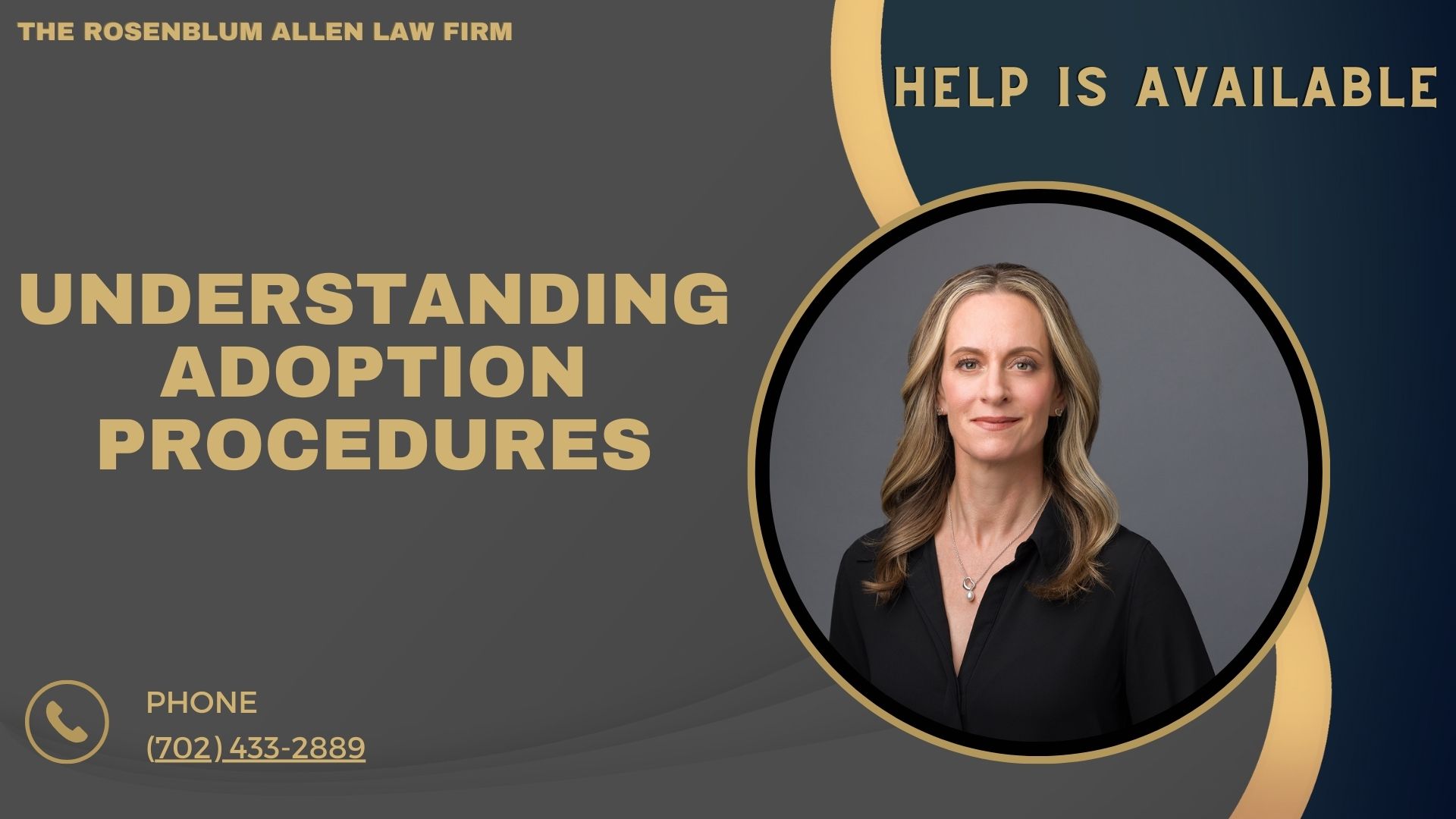Adoption procedures entail various legal steps and emotional considerations. Delve into this intricate process to navigate it successfully.

Defining Adoption Procedures
Adoption procedures refer to the structured steps involved in legally adopting a child. These steps encompass legal requirements, paperwork, home studies, and court proceedings.
Importance of Understanding Adoption Procedures
Prospective adoptive parents must understand adoption procedures. This understanding is crucial for them to embark on their journey with confidence. It ensures compliance with the law. It prepares emotionally for the process. It fosters realistic expectations.
Types of Adoption
People can adopt a child in many ways. Each has its own steps and things to think about.
Domestic Adoption
In domestic adoption, the child and adoptive parents live in the same country. It can be facilitated through different avenues:
Agency Adoption: Involves working with a licensed adoption agency that matches prospective parents with birth parents.
Independent Adoption: Allows adoptive parents to directly connect with birth parents, often facilitated by attorneys or adoption professionals.
Foster Care Adoption: This program provides the opportunity to adopt children who are in the foster care system and awaiting permanent placement.
International Adoption
International adoption involves adopting a child from another country. It has unique challenges and procedures:
Hague Convention Adoption: Countries that sign the Hague Convention follow specific procedures to ensure ethical adoption practices and protect the child’s interests.
Non-Hague Convention Adoption: Involves adopting from countries not part of the Hague Convention, often requiring additional legal steps and paperwork.
Understanding each type of adoption is crucial. It helps prospective parents choose the best path for their family.

Pre-Adoption Considerations
Before embarking on the adoption journey, there are several crucial considerations and preparations.
Legal Requirements
Adoption involves meeting specific legal criteria. These criteria may vary by the jurisdiction and type of adoption.
Age and Eligibility Criteria: Prospective adoptive parents must meet age requirements and may have additional eligibility criteria such as marital status or financial stability.
Criminal Background Checks: Applicants often undergo background checks to ensure the safety and well-being of the adopted child.
Home Studies: Home studies involve assessments of the prospective adoptive parent’s home environment, lifestyle, and readiness for adoption.
Financial Considerations
Adoption can incur significant costs, and understanding the financial aspects is crucial:
Adoption Costs: Expenses may include application fees, home study fees, legal fees, and travel expenses, which vary depending on the type of adoption.
Financial Assistance Options: To alleviate the financial burden, explore potential sources of financial assistance, such as grants, loans, employer benefits, or adoption tax credits.
Emotional Preparation
Emotionally preparing for the adoption journey is key. It’s needed for navigating its challenges and joys.
Counseling and Support Services: To address any emotional concerns or uncertainties, seek guidance from adoption professionals, support groups, or therapists.
Expectations and Realities: The adoption process may involve unexpected delays, setbacks, or emotional highs and lows. Maintaining realistic expectations can help manage stress and uncertainty effectively.
By addressing these pre-adoption considerations, prospective adoptive parents can better prepare themselves for the journey ahead and ensure a smoother adoption process.

Choosing an Adoption Agency or Attorney
Picking the right adoption professional is crucial. It requires careful thought and research.
Researching Adoption Professionals
Start by researching adoption agencies or attorneys in your area. Look for ones that specialize in your type of adoption.
Online Research: Use reputable websites, forums, and directories to gather information about adoption professionals.
Recommendations: Seek recommendations from friends, family members, or support groups with adoption experience.
Licensing and Accreditation: Verify that the adoption professional is licensed, accredited, or affiliated with reputable organizations.
Evaluating Agency or Attorney Credentials
Once you’ve identified potential adoption professionals, check their credentials and track record.
Experience: Consider the professional’s experience in handling adoptions, particularly those similar to your circumstances.
Success Rate: Inquire about the professional’s success rate in facilitating adoptions and ensuring positive outcomes for birth parents and adoptive families.
Ethical Practices: Ensure that the adoption professional adheres to ethical standards and practices, prioritizing the child’s best interests.
Meeting with Adoption Professionals
Schedule meetings with adoption agencies or attorneys. They are prospective. You will gather more information.
Ask Questions: Prepare a list of questions to ask during the meeting, covering topics such as the adoption process, fees, timelines, and support services.
Gauge Compatibility: Assess how comfortable you feel with the adoption professional and whether their values, communication style, and approach align with your preferences.
Obtain References: Request references or testimonials from past clients to gain insights into their experiences with the adoption professional.

Understanding Agency or Attorney Roles and Responsibilities
Before making a decision, clarify the roles and responsibilities of the adoption professional:
Services Offered: Determine the specific services provided by the adoption agency or attorney, including legal representation, matching services, counseling, and post-adoption support.
Communication and Updates: Establish expectations regarding communication frequency, updates on the adoption process, and availability for inquiries or concerns.
Contracts and Agreements: Review and understand any contracts or agreements before committing to working with the adoption professional, ensuring clarity on fees, services, and responsibilities.
The Adoption Process
The adoption journey has structured steps and milestones. It ends in the legal creation of the adoptive parent-child relationship.
Initial Consultation
Adoption starts with an initial consultation with your chosen professional.
Information Gathering: During the consultation, you’ll provide basic information about your family, preferences, and adoption goals.
Education: The adoption professional will educate you about the adoption process, requirements, and potential challenges.
Decision Making: Use this opportunity to ask questions, express concerns, and determine if you’re ready to proceed with the adoption process.
Application and Documentation
Once you’ve decided to move forward, you’ll need to do the paperwork. You’ll also need to gather the needed documents.
Application Forms: Fill out adoption application forms provided by the adoption agency or attorney, providing detailed information about your background, family, and preferences.
Legal Documentation: Prepare legal documents such as birth certificates, marriage certificates, financial statements, and any required background checks.
Birth Parent Consent: If pursuing domestic adoption, obtain consent from birth parents or legal guardians relinquishing parental rights.

Home Study
A home study is key to the adoption process. It ensures that families are ready for adoption.
Home Visit: A social worker or licensed professional will conduct one or more visits to your home to assess its safety, cleanliness, and suitability for raising a child.
Interviews: Expect interviews with all household members to evaluate their readiness for adoption and gather information about family dynamics, parenting styles, and support systems.
Education and Preparation: The home study process often includes educational components, such as adoption training sessions or counseling, to prepare prospective adoptive parents for the challenges and joys of adoption.
Matching Process
Once the home study is done, you’ll enter the matching phase. You’ll be matched with a prospective birth parent or child:
Profile Creation: Create a profile highlighting your family, interests, values, and reasons for adopting. This profile will be shared with prospective birth parents or adoption professionals.
Matching Criteria: Discuss your preferences and criteria for a match, such as the child’s age, gender, and medical history, as well as your openness to contact with birth parents.
Placement
Placement occurs when a child is formally placed with the adoptive family:
Transition Period: Depending on the type of adoption, there may be a transition period where the child gradually integrates into the adoptive family’s home.
Legal Formalities: Complete any necessary legal documentation to finalize the placement and ensure compliance with adoption laws and regulations.
Post-Placement Supervision
After the child is placed with the adoptive family, supervisors ensure the transition goes well. It provides support to both the child and the adoptive parents.
Supervision Process
Regular Visits: A social worker or adoption professional will conduct regular visits to assess the child’s adjustment and well-being in the adoptive home.
Supportive Guidance: Offer guidance and support to adoptive parents in addressing any challenges or concerns during the post-placement period.
Documentation: Maintain detailed records of post-placement visits, observations, and any recommendations or interventions to support the family.
Change and Support
Emotional Support: Provide emotional support to the child and adoptive parents as they navigate the adjustment period and bond as a family.
Resource Referrals: Connect the family with community resources, support groups, or counseling services to address specific needs or challenges.
Advocacy: Advocate for the child’s best interests and provide guidance on accessing any necessary services or interventions to support their development and well-being.
Finalization
Finalization is creating the permanent, legal parent-child relationship. This happens through a court decree of adoption.
Termination of Parental Rights
Legal Proceedings: Initiate legal proceedings to terminate the parental rights of the birth parents or legal guardians, ensuring compliance with applicable laws and regulations.
Best Interests of the Child: The termination of parental rights is based on the best interests of the child, prioritizing their safety, stability, and permanency.
Adoption Hearing
Court Appearance: Attend an adoption hearing where the adoptive parents formally petition the court to finalize the adoption.
Judge’s Approval: The judge reviews the case, ensuring that all legal requirements have been met, and issues a final adoption decree if satisfied.
Issuance of Final Decree of Adoption
Legal Recognition: Upon the issuance of the final decree of adoption, the adoptive parents’ legal rights and responsibilities are established, and the adoption is legally recognized.
Celebration: Celebrate the finalization of the adoption as a milestone in your journey to building your family through adoption.
The adoption process is finalized. It marks the end of months or years of preparation, anticipation, and hard work. Be grateful for this milestone. Celebrate the love and bond you’ve formed with your adopted child.

Legal Rights and Responsibilities
Both adoptive and birth parents need to understand adoption’s legal rights and duties.
Birth Parent Rights
Consent: Birth parents have the right to consent to the adoption of their child, typically following a waiting period and informed decision-making process.
Confidentiality: Depending on the type of adoption and applicable laws, birth parents may have the right to privacy regarding their identity and personal information.
Post-Adoption Contact: In some cases, birth parents may have the right to establish post-adoption contact agreements outlining the terms of communication or visitation with the adoptive family and child.
Adoptive Parent Rights
Legal Parentage: Upon finalization of the adoption, adoptive parents have the legal rights and responsibilities of biological parents, including custody, decision-making authority, and inheritance rights.
Access to Information: Adoptive parents may have access to information about the child’s medical history, background, and legal documentation, ensuring they can provide comprehensive care and support.
Support Services: Adoptive parents have the right to access support services, resources, and assistance to address the needs of their adopted child and navigate any challenges that arise.
Child’s Rights
Stability and Permanency: Every child has the right to stability, permanency, and a loving, supportive family environment, regardless of their biological or adoptive status.
Safety and Well-being: Adopted children have the right to safety, well-being, and protection from harm, with their best interests guiding all decisions related to their care and upbringing.
Identity and Heritage: Children have the right to know and understand their identity, heritage, and cultural background, with adoptive parents encouraged to support their connection to their birth culture and community.
Post-Adoption Contact Agreements
Voluntary Arrangements: Post-adoption contact agreements are voluntary arrangements between birth parents and adoptive parents that outline the terms of contact or communication following the adoption.
Legal Recognition: Depending on the jurisdiction, post-adoption contact agreements may be legally enforceable, providing clarity and accountability for both parties.
Beneficial Relationships: These agreements can facilitate ongoing relationships between birth parents, adoptive parents, and the adopted child, promoting openness, understanding, and support throughout the child’s life.

Challenges and Considerations
Adoption can be fulfilling. But, it also has unique challenges. Prospective adoptive parents should be aware of them.
Potential Challenges in the Adoption Process
Waiting Periods: The adoption process can involve significant waiting periods, from finding a match to finalizing the adoption, which requires patience and resilience.
Emotional Rollercoaster: Navigating the ups and downs of the adoption journey, including uncertainties, setbacks, and emotional highs and lows, can be emotionally taxing.
Legal Complexity: Adoption laws and regulations vary by jurisdiction and type of adoption, requiring careful navigation and legal guidance to ensure compliance and success.
Financial Strain: Adoption costs can be substantial, and unexpected expenses may arise throughout the process, necessitating financial planning and resourcefulness.
Potential Rejection: Prospective adoptive parents may experience rejection or failed matches, which can be disheartening but are part of the adoption journey’s realities.
Dealing with Rejection or Failed Placements
Emotional Support: Seek support from loved ones, adoption professionals, or support groups to process feelings of rejection, disappointment, or grief associated with failed placements.
Reflection and Resilience: Reflect on the experience, identify lessons learned, and cultivate resilience to continue pursuing adoption with determination and optimism.
Exploring Alternatives: To increase the likelihood of finding a successful match, consider exploring alternative adoption avenues, such as different types of adoption, agencies, or adoption professionals.
Legal and Emotional Support Resources
Legal Assistance: Consult with experienced adoption attorneys or professionals to navigate legal complexities, address challenges, and ensure compliance with adoption laws and regulations.
Counseling and Therapy: Engage in counseling or therapy to address emotional challenges, process feelings, and develop coping strategies to navigate the adoption journey effectively.
Support Groups: Join adoption support groups, both online and in-person, to connect with other adoptive parents, share experiences, and receive encouragement, guidance, and practical advice.

Breaking It All Down
The adoption journey is profound. It is transformative and filled with joy, challenges, and connections that have meaning. To start, you need knowledge and support. You also need a readiness to handle complexity and uncertainty.
Recap of Adoption Procedures
Throughout this guide, we’ve explored adoption procedures. We’ve covered the types of adoption. We’ve also covered the legal requirements, pre-adoption considerations, and the adoption process. You have delved into each step of the journey. You’ve gained insights into what to expect and how to prepare for adoption.
Importance of Seeking Legal Advice
Adoption is a legal process. It’s governed by specific laws and regulations. Seeking legal advice from experienced adoption attorneys or professionals is very important. Legal guidance ensures compliance with the law. It also protects your rights and interests. And, it maximizes the chance of a successful adoption.
Encouragement for Prospective Adoptive Parents
As you embark on your adoption journey, remember that you’re not alone. Contact adoption professionals, support groups, and loved ones for guidance, encouragement, and support. Embrace the challenges and joys of building your family through adoption. Know that every step brings you closer to your dreams.
The decision to adopt shows your love, compassion, and commitment. You want to provide a safe, nurturing, and loving home for a needy child. Embrace the journey with an open heart and a resilient spirit. Have hope for the bright future that awaits you and your adopted child. Together, you’ll start a journey of love, growth, and endless possibilities. You’ll do this as you build your family through adoption.

Frequently Asked Questions
What is adoption?
Adoption is the legal process. It transfers parental rights from a child’s birth parents or legal guardians. They go to adoptive parents. It makes the transfer permanent.
What are the different types of adoption?
There are several types of adoption. These include domestic adoption. It can be agency, independent, or foster care. There is also international adoption. It can be either the Hague Convention or non-Hague Convention.
What are the legal requirements for adoption?
Adoption laws vary by place. They usually need age eligibility. They also need background checks, home studies, and compliance with laws and regulations.
How much does adoption cost?
Adoption costs can vary a lot. They depend on factors such as the type of adoption, agency fees, legal expenses, and travel costs. It’s essential to budget and explore financial help options.
What is a home study?
A home study assesses if parents can adopt. It includes evaluations of their home, lifestyle, and readiness for adoption.
How are adoptive parents matched with a child?
Adoptive parents can find a child through many methods. These include making a profile. An agency or attorney can help. Also, there must be consent by birth and adoptive parents.
What happens after a child is placed with adoptive parents?
After placement, supervision ensures a smooth transition. It supports the child and adoptive parents through visits, guidance, and resource referrals.
What is the finalization process?
Finalization creates the legal parent-child relationship. It does this through a court decree of adoption. This process usually involves ending parental rights and a final adoption hearing.
What legal rights and responsibilities do adoptive parents have?
After finalizing the adoption, adoptive parents have the same legal rights and duties as birth parents. These include custody, decision making, and financial support.
What support is available for prospective adoptive parents?
Prospective adoptive parents can get support. They can get counseling, support groups, and legal help. These help them navigate the adoption process and address challenges.
What are some common challenges in the adoption journey?
The adoption journey has common challenges. These include waiting. There are also emotional ups and downs. There is legal complexity and money problems. Plus, possible rejection or failed placements.
How can prospective adoptive parents prepare for the adoption journey?
Future adoptive parents can prepare for the adoption journey. They can do this by learning about adoption rules. They can also seek legal and emotional help. They should also keep realistic expectations.
What are post-adoption contact agreements?
These agreements are voluntary. They are between birth parents and adoptive parents. They outline the terms of contact or communication after the adoption. They can vary based on individual preferences and circumstances.
How can I learn more about adoption procedures?
For more about adoption procedures, ask good agencies, attorneys, and support groups. Also, use online resources. They should fit your needs and preferences.

Additional Resources for You
Don’t forget, in addition to the valuable information provided here, our lead attorney, Molly Rosenblum Allen, Esq, has created several resources to assist you in your time of need:
- Las Vegas Guardianship Attorney: Get effective guidance on guardianship matters in Las Vegas.
- Legal Guardianship: Understand the legal aspects of guardianship arrangements.
- Guardianship Forms: Access helpful forms and documents for guardianship proceedings.
- Guardianship of a Child in Las Vegas: Learn about the process of establishing guardianship for a child in Las Vegas.
- Adult Guardianship: Discover the responsibilities and procedures involved in adult guardianship.
- Types of Guardianship: Explore different types of guardianship arrangements and their implications.
- Pros and Cons of Guardianship: Weigh the advantages and disadvantages of pursuing guardianship.
- Dependency Cases: Learn about legal proceedings involving dependent children.
- Terminate Legal Guardianship: Understand the process of ending a legal guardianship arrangement.
- Parental Responsibility for Disabled Adults in Nevada: Navigate the legal responsibilities of parents with disabled adult children in Nevada.
- Nevada Power of Attorney: Gain insights into establishing a power of attorney in Nevada.

Outside Resources for You
Here are some offsite resources related to the content that you may find useful:
- Child Welfare Information Gateway: A comprehensive resource provided by the U.S. Department of Health and Human Services offering information on various aspects of child welfare, including adoption and guardianship.
- National Adoption Center: A nonprofit organization dedicated to expanding adoption opportunities for children in the U.S. foster care system, providing information and support for adoptive families.
- AdoptUSKids: A national project that connects children in foster care with adoptive families, offering resources, support, and information on the adoption process.
- Child Welfare League of America (CWLA): A coalition of hundreds of private and public agencies serving vulnerable children and families, providing advocacy, research, and resources related to child welfare, including adoption.
- North American Council on Adoptable Children (NACAC): A nonprofit organization providing advocacy, support, and resources to adoptive families and children, including information on adoption subsidies and support services.
- National Council for Adoption (NCA): A nonprofit organization advocating for the rights of children and families in the adoption process, offering resources, education, and advocacy on adoption-related issues.

A Special Message from Our Lead Attorney, Molly Rosenblum Allen, Esq

Thank you for taking the time to explore our resources! If you have questions or need personalized legal help, please reach out. Feel free to schedule a free consultation by calling (702) 433-2889. We’re here to help you navigate your legal journey with confidence. I am looking forward to assisting you!






